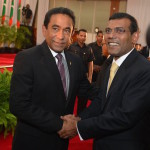President Mohamed Nasheed has opened the Maldives as a place “to test the latest renewable technologies in energy, waste, water, housing and transport.”
Speaking at the World Future Energy Summit in Abu Dhabi, Nasheed invited assembled government ministers and energy company representatives “to come to the Maldives and share the best of your technologies.”
“The Maldives is open for business. To my mind, the smart money is green,” he said, predicting the introduction of a carbon market would eventually drive up the price of fossil alternatives.
“Renewables are becoming more efficient and affordable. While fossil fuels may [now] appear cheaper, sooner or later polluters will be forced to pay for the damage their products cause. When they do, market failures will be corrected and carbon pollution will be properly penalised.”
During the three day Summit, Abu Dhabi’s General Sheikh Mohammed bin Zayed Al Nahyan announced the emirate will invest US$15 billion in alternative energy projects, including Masdar City, the world’s first carbon and waste-free city.
“Abu Dhabi has reliably provided the world with energy for several decades,” Sheikh Mohammed said. “Global demand for energy continues to increase ever rapidly. As an energy provider, we have the responsibility to continue to meet that demand.”
Nasheed said he hoped Abu Dhabi’s “pioneering work in renewable energy and carbon neutrality” could be utilised in the Maldives to help fulfil the country’s ambitions of becoming carbon neutral in 10 years.
“I am here today because, in many ways, Abu Dhabi represents the future,” he said.
“I am here because this enlightened country is jettisoning the past and embracing change. Abu Dhabi is investing the proceeds of yesterday’s resources to build the green economy of tomorrow.”
Abu Dhabi is a cosmopolitan metropolis that sits on nine per cent of the world’s oil reserves and generates 15% of the GDP of the United Arab Emirates. Much of the emirate’s wealth stems from the state-owned Abu Dhabi National Oil Company which produces 2.7 million barrels of oil a day, a figure the company has previously said it hopes to push to four billion during 2010.
“Some nations choose to take a back seat in this green revolution,” Nasheed said, “but others, such as Abu Dhabi, are playing a major role in the greatest transformation since the start of the Industrial Age. With the leadership being shown here, I am certain we can tackle the climate crisis.”





